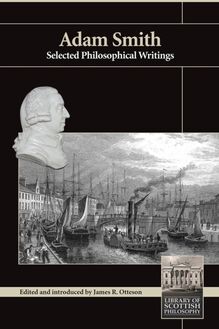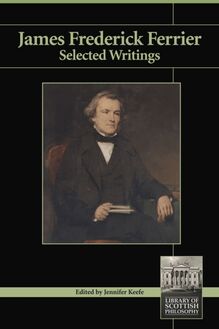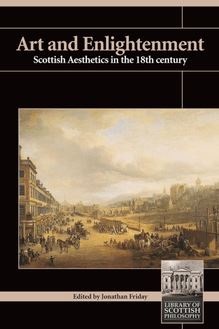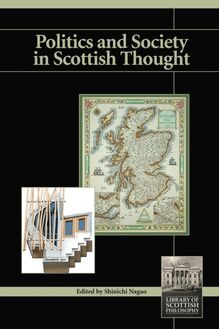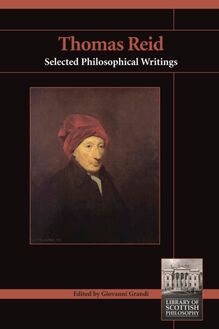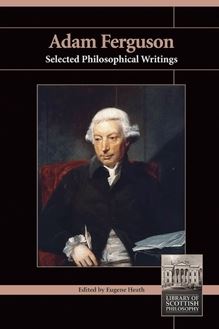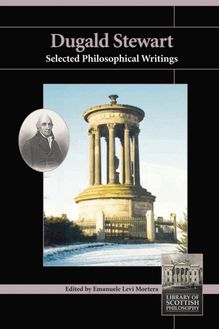Scottish Philosophy in America , livre ebook
108
pages
English
Ebooks
2012
Vous pourrez modifier la taille du texte de cet ouvrage
Obtenez un accès à la bibliothèque pour le consulter en ligne En savoir plus
Découvre YouScribe en t'inscrivant gratuitement
Découvre YouScribe en t'inscrivant gratuitement
108
pages
English
Ebooks
2012
Vous pourrez modifier la taille du texte de cet ouvrage
Obtenez un accès à la bibliothèque pour le consulter en ligne En savoir plus
Publié par
Date de parution
19 juillet 2012
Nombre de lectures
4
EAN13
9781845404369
Langue
English
Publié par
Date de parution
19 juillet 2012
Nombre de lectures
4
EAN13
9781845404369
Langue
English
Title page
SCOTTISH PHILOSOPHY IN AMERICA
Edited and Introduced
by James J.S. Foster
IMPRINT ACADEMIC
Copyright page
Copyright © James J.S. Foster, 2012
The moral rights of the author have been asserted.
No part of this publication may be reproduced in any form without permission, except for the quotation of brief passages in criticism and discussion.
Originally published in the UK by Imprint Academic
PO Box 200, Exeter EX5 5YX, UK
Originally published in the USA by Imprint Academic
Philosophy Documentation Center
PO Box 7147, Charlottesville, VA 22906-7147, USA
2012 digital version by Andrews UK Limited
www.andrewsuk.com
Full series details:
www.imprint-academic.com/losp
Series Editor’s Note
The principal purpose of volumes in this series is not to provide scholars with accurate editions, but to make the writings of Scottish philosophers accessible to a new generation of modern readers in an attractively produced and competitively priced format. In accordance with this purpose, certain changes have been made to the original texts: Spelling and punctuation have been modernized. In some cases the selections have been given new titles. Some original footnotes and references have not been included. Some extracts have been shortened from their original length. Quotations from Greek have been transliterated, and passages in languages other than English translated, or omitted altogether.
Care has been taken to ensure that in no instance do these amendments truncate the argument or alter the meaning intended by the original author. For readers who want to consult the original texts, full bibliographical details are provided for each extract.
The Library of Scottish Philosophy was originally an initiative of the Centre for the Study of Scottish Philosophy at the University of Aberdeen. The first six volumes, published in 2004, were commissioned with financial support from the Carnegie Trust for the Universities of Scotland. In 2006 the CSSP moved to Princeton where it became one of three research centers within the Special Collections of Princeton Theological Seminary, and with the Seminary’s financial support more volumes have been published. Scottish Philosophy in America is the thirteenth volume in the series and has been prepared for publication by James Foster.
Acknowledgements
The CSSP gratefully acknowledges financial support from the Carnegie Trust and Princeton Theological Seminary, the enthusiasm and excellent service of the publisher Imprint Academic, and the permission of the University of Aberdeen Special Collections and Libraries to use the engraving of the Faculty of Advocates (1829) as the logo for the series.
Gordon Graham,
Princeton, January 2012
James J.S. Foster: Introduction
I. Pre-Revolutionary America
The one hundred years between the first half of the eighteenth century and the second half of the nineteenth mark out a period of remarkable intellectual achievement in Scotland. On account of the lasting and significant impact that the work of Scottish thinkers had during this time on the fields of science, philosophy, economics, and politics, this period has often been labelled ‘the Scottish Enlightenment’. In the pre-Revolutionary era in America, the philosophy of the Scottish Enlightenment influenced the intellectual climate of the British colonies in chiefly two ways. The first was straightforwardly academic and literary. Volumes by Scottish philosophers such as Henry Home (Lord Kames), Francis Hutcheson, and Adam Ferguson were frequently found alongside those of their English and French peers in the libraries of educated colonials. Accordingly, the writers of the Scottish Enlightenment were part of the general European influence on the intellectual climate of America. In this capacity, Scottish philosophy had a measurable impact on academic work in the colonies: as the influence of Thomas Reid and David Hume on Benjamin Rush’s writings on epistemology (see Reading II) and on the future Supreme Court Justice James Wilson’s Lectures on Law (see Reading VI and VII) attest. Discounting regional and confessional differences, however, the Scots were at this time no more or less influential than their British and Continental contemporaries; all of whom stood beneath the long shadow of the great English triumvirate of Bacon, Newton and Locke.
More significantly, the Scottish Enlightenment was also pedagogically influential in pre-Revolutionary America. Although the British colonists were, overall, by no means as culturally advanced as their British cousins, several colleges—including Harvard, Yale, Princeton, and Penn—were established during this era. In both the structure and the staffing of these institutions, Scottish Enlightenment thinking played an important role. In contrast to the more theoretically oriented dons of Oxford and Cambridge, educators in the colonies saw higher education as a method for training capable and responsible citizens. They therefore found themselves in much agreement with the ancient but similarly practical universities of Scotland. Thus, for example, when William Smith set out to write his Outlines on the College of Mirania (see Reading I), which would later serve as the blueprint for the College of Philadelphia (now University of Pennsylvania), he looked first to integrated pedagogy of Marischal and King’s College in Aberdeen for inspiration. Further, in constant need of English-speaking professors to fill their faculties, newly founded American colleges frequently sought graduates of Scottish institutions. Although often initially reluctant to relocate to what was then the western edge of civilization, upon arriving in the New World Scottish educators frequently played formative roles in the education of the Revolutionary generation.
II. The Early Days of the Republic
Due to the personal contact between leaders in the Revolutionary generation and educators steeped in Scottish Enlightenment thinking, the influence of Scottish philosophy increased during the time surrounding the war. Thomas Jefferson, for example, who was mentored by the Scottish William Small at The College of William and Mary, frequently attested to his life-long admiration for the moral philosophy of Francis Hutcheson and political writings of Henry Home (Lord Kames). Similarly, there is good reason to believe that James Madison, who attended the College of New Jersey (now Princeton University) during the presidency of Rev. John Witherspoon (see Readings III–V) drew heavily on the writings of Kames, Smith, and Hume during the composition of his immensely influential pamphlet ‘Federalist Number 10’. Further increasing the stature of Scottish philosophy in America, the years of the Revolution and the founding of the United States also coincided with what may be considered the high-water mark of the Enlightenment in Scotland. Famously, Adam Smith published The Wealth of Nations in the momentous year of 1776; while Reid published the Essays on the Intellectual Powers of Man in 1785, drawing further attention to Hume’s previously under-appreciated Treatise (1739) and Enquiries (1748 and 1751). Yet, for all this, the philosophy of the Scottish Enlightenment during this period is still better seen as part of the pan-European intellectual influence on America than as a single tradition. For, even as the stature of English writers withered in the United States under the heat of revolutionary fervour, the popularity of France’s philosophes flourished on account of the close political ties between the two young republics. Further, although the Scottish luminaries of the day, like the great majority of intellectuals in the late eighteenth century, were near-unanimous in their admiration of Baconianism, there was as yet too much diversity in their methods and considered opinions to warrant the now-common, if misleading, identification of Scottish Enlightenment philosophy with Common-Sense Realism.
In the final years of the eighteenth century, as the optimism of the early stages of the French Revolution rapidly devolved into the horror for which it is remembered today, however, a conservative reaction precipitated both a narrowing of the Scottish Enlightenment tradition and a dramatic increase in its influence in the United States. During the American Revolution, Voltaire and Rousseau were widely read and admired on account of their disdain for monarchy and the Roman Catholic church. Following the execution of Louis XVI, the terror, and, most especially, the French invasion of the Calvinist heartlands of Switzerland and Holland, though, French irreligion could no longer be ignored. Indeed, in a stark departure from their previous attitude of indifference, American religious leaders turned sharply against the fledgling French Republic and—despite the tenuous connection between even Rousseau’s most immodest comments regarding the General Will and the tyranny of Robespierre—the previously lauded works of its intellectual forebears. Thus, by the advent of the nineteenth century, the previously tolerated philosophical and religious scepticism of the French philosophes was widely portrayed in America not only as heretical and blasphemous, but as part of an insidious international conspiracy bent on undermining traditional religion and morality.
Somewhat unfairly, several non-French writers were also implicated in the general anti-sceptical reaction. Foremost among these newly condemned was David Hume, whose scepticism and thinly-veiled criticism of Christianity had until then been largely neglected in the United States on account of the popularity of his six-volume History of England (1754–62). No doubt aided by the posthumous publ
